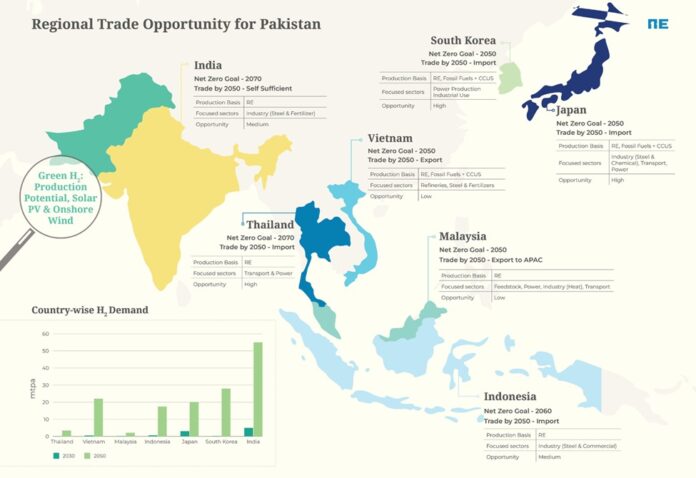ISLAMABAD, Oct 24 (APP):The Renewables First on Thursday hosted an insightful webinar titled “Incorpor
ating Sustainability in Green Hydrogen Advancements” that brought together industry experts, researchers, and policymakers to discuss the critical role of sustainability in the emerging green hydrogen economy, with a focus on its implications for Pakistan.
The webinar emphasized that achieving net-zero carbon emissions by 2050 requires the decarbonization of hard-to-abate sectors. Green hydrogen has emerged as a crucial element in this transition, with applications in ammonia production, oil refinery desulphurization, and steel manufacturing, a news release said.
Associate at Renewables First, opened the session by presenting key findings from her study, “Integr
ating Sustainability in Green Hydrogen Advancements for Pakistan.” She emphasized the sustainability aspects of green hydrogen development and projected that by 2050, Paki
stan could produce green hydrogen at $0.6-$1.6/kg, cre
ating export opportunities to Asian countries. While the outlook for green hydrogen depends on the specific needs of each country, integr
ating sustainability remains a universal requirement.
Afaf also highlighted how green hydrogen projects could help address water scarcity through seawater desalination for drinking and irrigation, stressing the need for transparent legal frameworks in strategy development.
Researcher, Energy and Climate at Oeko-Institut, Germany, Susanne Kri
eger discussed the distinctions between green and sustainable hydrogen. She emphasized the importance of balanced resources and land use to ensure socio-economic co-benefits from hydrogen production.
Partner and Country Lead for ESG, Climate Change, and Decarbonization at KPMG-Pakistan, Syed Ahson Ali Shah provided an overview of ESG (Environmental, Social, and Governance) considerations in decarbonizing the economy. He highlighted that the Securities and Exchange Commission of Paki
stan (SECP) will begin implementing ESG regulations next year.
Chief of the SDGs Unit at the Ministry of Planning, Development, and Special Initiatives (MoPDSI), Dr. Muhammad Ali Kemal spoke about the current progress on the Sustainable Development Goals (SDGs). He emphasized that facilit
ating carbon markets and advancing green hydrogen initiatives would contribute to Pakistan’s sustainable economic development.
The webinar featured an interactive session, with participants engaging the panel in a lively Q&A. The discussion underscored the importance of aligning Pakistan’s emerging hydrogen strategy with global sustainability standards, while also addressing local challenges such as energy poverty and inequality.
